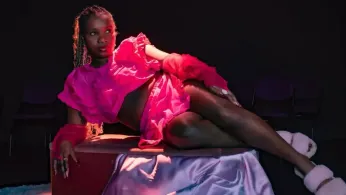
4 hours ago
Bisexual Playwright and Performer Temi Wilkey Is Serving "Main Character Energy"
READ TIME: 4 MIN.
Temi Wilkey, a dynamic force in contemporary British theatre, is the subject of an in-depth and celebratory profile in DIVA Magazine’s September 2025 issue, marking the publication’s 31st anniversary in print . Wilkey’s career, spanning stage, screen, and activism, has positioned her as a leading voice among bisexual and queer performers, distinguished by a fearless approach to storytelling that centers marginalized experiences.
Wilkey’s latest solo show, “Main Character Energy,” is described as “camp, colourful and utterly captivating”—a genre-defying blend of dance, spoken word, comedy, and Shakespearean flair that keeps audiences riveted from her first commanding entrance . Clad in hot pink, Wilkey’s stage presence is matched only by the depth and complexity of her narrative, which interweaves personal history with broader themes of race, queerness, and self-acceptance.
A hallmark of Wilkey’s artistry is her refusal to be confined by conventional genres or expectations. Having previously written for acclaimed series like “Sex Education” and earned the Stage Debut Award for her play “High Table,” Wilkey continues to push boundaries—not only in content but in theatrical form . “I feel like my first play was queer in content, whereas this is queer in form,” she notes, underscoring how “Main Character Energy” is a product of both her personal journey and the collaborative efforts of an almost entirely queer creative team.
The show’s structure—mixing clowning, stand-up, and dance—reflects Wilkey’s view that queerness defies easy categorization. As she explains, “You can’t just put it in one box, and that feels queer to me” . This approach resonates with audiences who see themselves reflected not only in the stories Wilkey tells but in the playful, campy aesthetic that runs throughout her work.
Integral to Wilkey’s current tour are her “BLACK OUT” nights—special performances inviting Black audiences to experience the show free from the white gaze. These events, which have been emotionally significant for Wilkey, offer a rare space for communal celebration and healing . “It’s a unique experience for an audience to get to watch something that was made for them and is just for them. It feels like home,” she shares, drawing a parallel to the concept of the male gaze and its impact on self-perception.
Wilkey is candid about the challenges Black actors face in the theatre industry, noting that institutional racism and white supremacy often complicate journeys of self-love and acceptance. Yet she chooses to explore these themes through humor and absurdity, finding catharsis not in drama but in laughter. “Exploring the funny is powerful. It feels more cathartic than exploring it in a dramatic way,” she reflects, crediting fellow queer artist Travis Alabanza for influencing her perspective on the “psychosis of race” .
Wilkey’s visibility as a bisexual performer is an essential part of her narrative, and she is outspoken about the importance of queer community in her creative process. Her friendships with transgender women, in particular, have profoundly shaped her understanding of femininity, self-expression, and camp . In a related DIVA Magazine essay, Wilkey writes about how affirmation from trans femmes inspired her own reclamation of hyper-femininity—a journey that ultimately led to the exuberant style and tone of “Main Character Energy.”
Wilkey’s embrace of “bubblegum pops of colour” and playful self-presentation is a defiant celebration of beauty that has historically been denied to Black women and trans feminine people. “The relationship I have with femininity now, through my hyper-femininity, is playful, ironic – it’s camp,” she explains, attributing much of her creative “sauce” to the influence of trans femmes .
This intersectional perspective is further reflected in Wilkey’s commitment to centering queer and trans voices within her productions. “So much of queer culture, nay – culture itself has been informed by, nay – created by trans people,” she writes, citing the legacy of Ballroom and Black trans-led scenes as foundational to broader queer culture .
“Main Character Energy” is the first installment of a planned trilogy exploring love in its many forms—between individuals and within oneself. Wilkey’s ambitious vision seeks to highlight how institutional barriers make self-love and connection more challenging, especially for Black and queer people . “I want the trilogy to take on how we love each other and ourselves,” she says, positioning her work as both a celebration and critique of the social structures that shape identity.
Wilkey’s reflections on childhood, faith, and transformation add further depth to her performances. The show is, in her words, “for a younger version of myself,” a testament to the healing and affirmation that comes from seeing one’s story center stage. “I think she would really love it. I also think she would be surprised by it, because when I was younger, I was very Christian. She would think: ‘What is this hedonism?’” .
Wilkey’s profile in DIVA Magazine underscores her significance not just as a performer, but as an advocate for authentic representation within British arts and media. By foregrounding stories that grapple with race, queerness, and joy, Wilkey challenges audiences and institutions to reconsider whose voices are heard and celebrated.
Her work reflects a broader movement within theatre and entertainment toward inclusivity and intersectionality—a shift that is increasingly visible across UK stages and screens . As Wilkey continues her tour and develops new projects, her influence on LGBTQ+ culture and visibility is likely to grow, inspiring future generations of artists to claim their own “main character energy.”






